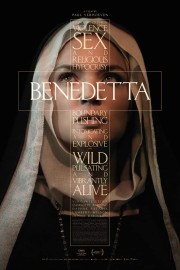Benedetta
It’s been 15 years since I’ve watched a new Paul Verhoeven film. I know “Elle” is considered one of his best, but I’ve just been unable to make time for it yet. “Benedetta” is a story that feels like prime material for the director of “Basic Instinct,” “Robocop” and “Showgirls”- lesbian nuns, blasphemy, outrageous violence- but the way he tells this story, he lets the sensational almost sneak up on us rather than just throwing it in our faces. I cannot help but admire that from him.
“Benedetta” is based on the book by Judith C. Brown, and tells the story of Benedetta Carlini, a 17th Century nun whom joins a convent in Italy as a child, and gradually reveals herself to be a mystic. She also gets involved in a lesbian relationship with a new member of the convent, Bartolomea (Daphne Patakia), and becomes the head of the convent before being tried and jailed for the rest of her life. One of the things most compelling in the screenplay by Verhoeven and David Birke is that yes, there is vulgarity constantly in this film, but it also can be seen as a very sincere biopic about a woman who does hold a unique place in the history of the Catholic Church. It’s almost as if Verhoeven used his reputation for the outrageous to get funding for this film to sneak in ideas of faith, love of God and humanity, illicit love, and accepting one’s fate.
As an adult, Benedetta is played by Virginie Efira, whom I just saw in her 2019 psychological drama, “Sibyl,” a few months ago. Efira is very much an actress who seems to be interested in exploring the same things in her characters that Verhoeven is- intelligence, emotional honesty, sexuality and moral grey areas. When Benedetta has her first vision of Jesus as an adult, it’s hard to know whether they are genuine, or if she’s genuinely psychotic. When she gets the stigmata on her body, we cannot help but ask whether it’s something she did to herself, or a true miracle. The abbess of the convent, played by the great Charlotte Rampling, isn’t quite sure, either, but she senses something about Benedetta that she doesn’t sense from others living there. The question exists throughout the film as to the validity of Benedetta’s visions and stigmata, but all the way to the end, her faith doesn’t waver. Verhoeven and Efira seem to be exploring the idea of individual faith vs. institutional faith, and it’s fascinating to see how even characters we don’t necessarily expect adapt to that idea throughout the film.
I’m used to Hollywood Verhoeven, who pushed things to extremes. The only film of his outside of Hollywood I’ve seen is “The Black Book,” and how interesting that he seemed to be someone who explored genre in Hollywood, and history- or his own spin on it- outside of American studios. He’s always been interested in ideas and themes, sex and violence, and how outrageous situations can bring people together in unexpected ways. I think he did so successfully in a lot of his Hollywood films, but with “Benedetta,” he does so on a deeper level that does more than just play to our basest instincts. I hope he and Efira continue their collaboration on doing so in the future.










